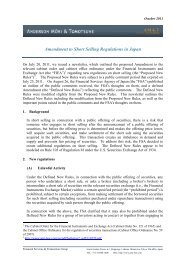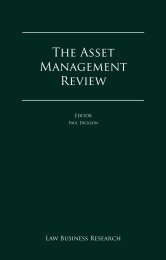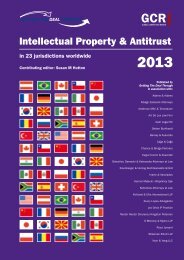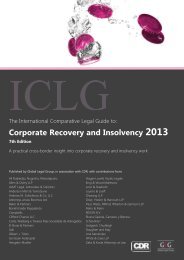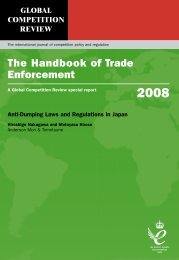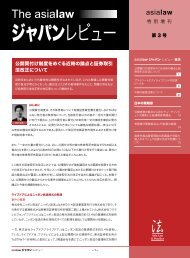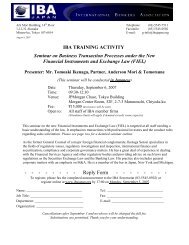Franchise
Franchise
Franchise
Create successful ePaper yourself
Turn your PDF publications into a flip-book with our unique Google optimized e-Paper software.
contents®<strong>Franchise</strong> 2014Contributing editorPhilip F ZeidmanDLA Piper LLP (US)PublisherGideon RobertonBusiness development managersAlan LeeGeorge IngledewDan WhiteAccount managerMegan FriedmanTrainee account managersCady AtkinsonJoseph RushDominique DestréeEmma ChowdhuryMedia coordinatorParween BainsAdministrative coordinatorSophie HickeyTrainee research coordinatorRobin SynnotMarketing manager (subscriptions)Rachel Nursesubscriptions@gettingthedealthrough.comHead of editorial productionAdam MyersProduction coordinatorLydia GergesSenior production editorJonathan CowieSubeditorClaire AncellDirectorCallum CampbellManaging directorRichard Davey<strong>Franchise</strong> 2014Published byLaw Business Research Ltd87 Lancaster RoadLondon, W11 1QQ, UKTel: +44 20 7908 1188Fax: +44 20 7229 6910© Law Business Research Ltd 2013No photocopying: copyright licencesdo not apply.First published 20068th editionISSN 1752-3338Introduction Philip F Zeidman DLA Piper LLP (US) 3Australia Philip Colman and John Sier Mason Sier Turnbull 5Austria Sylvia Freygner and Philipp von Schrader Dr Sylvia Freygner, LLM Rechtsanwältin 13Belgium Pierre Demolin, Véronique Demolin, Benoit Simpelaere and Leonard Hawkes DBB 20Canada Bruno Floriani and Marvin Liebman Lapointe Rosenstein Marchand Melançon LLP 25Colombia Juan Carlos Uribe and Juliana Barrios Triana, Uribe & Michelsen 34Czech Republic Barbara Kusak and Halka Pavlíková Noerr sro 40Denmark Jacob Ørskov Rasmussen, Gitte Holtsø and Anna Gentzschein Plesner Law Firm 48Finland Patrick Lindgren Advocare Law Office 55France Emmanuel Schulte Bersay & Associés 62Germany Karsten Metzlaff and Tom Billing Noerr LLP 69Hong Kong Ella Cheong Ella Cheong (Hong Kong & Beijing) 76India Abhijit Joshi, Kunal Doshi and Rishika Harish AZB & Partners 81Indonesia Galinar R Kartakusuma and Reagan Roy Teguh Makarim & Taira S 87Italy Roberto Pera and Filippo Maria Catenacci Rödl & Partner 95Japan Etsuko Hara Anderson Mōri & Tomotsune 103Malaysia Jin Nee Wong Wong Jin Nee & Teo 109Mexico Jorge Mondragon Gonzalez Calvillo SC 116Netherlands Tessa de Mönnink De Grave De Mönnink Spliet Advocaten 123New Zealand Stewart Germann Stewart Germann Law Office 130Philippines Ferdinand M Negre and Jasmine L Solivas-DayacapBengzon Negre Untalan Intellectual Property Attorneys 135Russia Evgeny Zhilin, Anna Kotova-Smolenskaya and Denis Shumskiy Yust Law Firm 141Singapore Rhonda Hare and Alison Tonges Ashurst LLPStefanie Yuen Thio and Dayne Ho TSMP Law Corporation 146South Africa Eugene Honey Adams & Adams 152Switzerland Martin Ammann and Christophe Rapin Meyerlustenberger Lachenal 159Thailand Chanvitaya Suvarnapunya and Pattama Jarupunphol DLA Piper (Thailand) Limited 166Turkey Hikmet Koyuncuoglu and Seza Ceren Aktas Koyuncuoglu & Koksal Law Firm 172Ukraine Mansur Pour Rafsendjani and Volodymyr Yakubovskyy Noerr LLP 178United Kingdom Chris Wormald and David Bond Field Fisher Waterhouse LLP 184United States Michael G Brennan and Philip F Zeidman DLA Piper LLP (US) 190Vietnam Thom Thi Mai Nguyen and Huong Thi Thanh Nguyen Tilleke & Gibbins 200The information provided in thispublication is general and may not applyin a specific situation. Legal advice shouldalways be sought before taking any legalaction based on the information provided.This information is not intended tocreate, nor does receipt of it constitute, alawyer–client relationship. The publishersand authors accept no responsibility forany acts or omissions contained herein.Although the information provided isaccurate as of August 2013, be advisedthat this is a developing area.Printed and distributed byEncompass Print SolutionsTel: 0844 2480 112LawBusinessResearch
Anderson Mōri & TomotsunejapanJapanEtsuko HaraAnderson Mōri & TomotsuneOverview1 What forms of business entities are relevant to the typical franchisor?The most typical franchisors are organised in the form of a jointstockcompany.2 What laws and agencies govern the formation of business entities?The formation of joint-stock companies in Japan is governed bythe Companies Act (Act No. 86, 2005) and administered by theMinistry of Justice.3 Provide an overview of the requirements for forming and maintaining abusiness entity.The formation of a joint-stock company requires articles of incorporationand other incorporation documents to be prepared andregistered at a competent legal affairs bureau. After incorporation, itis necessary to prepare financial statements etc, and to hold a shareholders’meeting each year.4 What restrictions apply to foreign business entities and foreigninvestment?Foreign business entities must register their representatives in Japanin order to conduct business continuously in the country. Once registered,they can carry out business in the same way as domesticentities. In addition, foreign investment is regulated by the ForeignExchange and Foreign Trade Act (Act No. 228 of 1949 – FEFTA).Industry-specific laws may also apply, depending on the businesssector of the foreign entities.5 Briefly describe the aspects of the tax system relevant to franchisors.How are foreign businesses and individuals taxed?Franchisors in the form of joint-stock companies need to pay corporatetax, corporate enterprise tax, corporate inhabitant tax andconsumption tax. Depending on the nature of the assets held by afranchisor, property tax and automobile tax may also be payable.Foreign businesses’ and individuals’ income sourced in Japan is generallysubject to Japanese taxation.6 Are there any relevant labour and employment considerations fortypical franchisors? What is the risk that a franchisee or employees ofa franchisee could be deemed employees of the franchisor? What canbe done to reduce this risk?Labour regulations generally apply to franchisors, especially withregard to the relationship between franchisors and their respectiveemployees. Nevertheless, in a typical franchise arrangement, a franchiseeand the employees of a franchisee are not considered to beemployees of the franchisor. To avoid the risk that a franchisee oremployees of a franchisee could be deemed employees of the franchisor,a franchisor needs to structure the franchise relationship sothat the franchisee is an independent entity, and needs to clearlyexplain the independent nature of the franchise relationship withthe franchisee. In addition, if a franchisor is involved in the hiringprocess of employees of the franchisee, it should explain its positionand make it clear to the prospective employees that the employerwill be the franchisee, not the franchisor. Breach of labour regulationsmay result in penalties including imprisonment.7 How are trademarks and know-how protected?Franchisors can register trademarks to protect such marks frominfringing use. Nevertheless, there is no registration system per sefor know-how. Know-how that falls within the scope of registrabletypes of intellectual property, such as patents, designs or copyrights,may be registered accordingly. In addition, if the know-how fallswithin the scope of a ‘trade secret’ under the Unfair CompetitionPrevention Act (Act No. 47 of 1993), it will be protected against anyacts constituting unfair competition.8 What are the relevant aspects of the real estate market and realestate law?In general, a franchisee leases real estate for its operations directlyfrom a property owner. Disputes may arise when the lessor tries toincrease the rent or terminate or refuse to renew the lease agreement.In such situations, protection would be available to the franchiseeunder the Land Lease and Building Lease Act (Act No. 90, 1991)and the doctrine of the destruction of a relationship of mutual trust(see question 28).Laws and agencies that regulate the offer and sale offranchises9 What is the legal definition of a franchise?There is no uniform definition of a franchise in Japan. Nevertheless,there are three relevant definitions with regard to franchise businesses.Firstly, the Medium and Small Retail Commerce PromotionAct (Law No. 110 of 1973 – MSRCPA) defines a ‘chain business’ asa business that, pursuant to an agreement with uniform terms andconditions, continuously sells or acts as an agent for sales of productsand provides guidance regarding management, and primarilytargets medium and small retailers. In addition, a ‘specified chainbusiness’ is defined as ‘any chain business the agreement for whichincludes clauses which permit its members to use certain trademarks,trade names or any other signs, and collects joining fees, deposits orany other money from the member when becoming a member’. If afranchise business falls under this definition, the regulations of theMSRCPA apply.www.gettingthedealthrough.com 103
japananderson Mōri & TomotsuneSecondly, the Guidelines Concerning the <strong>Franchise</strong> System(<strong>Franchise</strong> Guidelines) under the Act on Prohibition of PrivateMonopolisation and Maintenance of Fair Trade (Act No. 54 of1947 – Antimonopoly Act) provides the following:The franchise system is defined in many ways. However, the franchisesystem is generally considered to be a form of business inwhich the head office provides the member with the right to usea specific trademark and trade name, and provides coordinatedcontrol, guidance, and supports for the member’s business and itsmanagement. The head office may provide support in relation to theselling of commodities and the provision of services. In return, themember pays the head office.Thirdly, the Japan <strong>Franchise</strong> Association (JFA) defines a franchise as:A continuing relationship between one business concern (calleda Franchisor) and another business concern (called a <strong>Franchise</strong>e)where a Franchisor and a <strong>Franchise</strong>e enter into a contractual agreement,the Franchisor granting the <strong>Franchise</strong>e the right to use thesigns representing the Franchisor’s business, which signs includethe Franchisor’s logo, service mark, trade name and others as wellas the Franchisor’s management know-how, and to conduct theproduct sales and other businesses which bear the same image asthe Franchisor’s; the <strong>Franchise</strong>e paying the consideration to theFranchisor in return, providing the fund required for the business,and operating the business under the Franchisor’s guidance andassistance.10 Which laws and government agencies regulate the offer and sale offranchises?If the franchise business falls within the scope of a specified chainbusiness, the MSRCPA regulates the disclosure obligations relatedto the offer and sale of franchises. The Ministry of Economy, Tradeand Industry, as well as other Ministries, depending on the productssold by the franchise business, have overall responsibility in thisregard.From the perspective of competition law, the <strong>Franchise</strong>Guidelines regulate the offer and sale of franchises in connectionwith the Antimonopoly Act, and the Fair Trade Commission hasoverall responsibility in this regard.The JFA has also implemented voluntary rules, such as theJapan <strong>Franchise</strong> Association Code of Ethics and the VoluntaryStandard Regarding Disclosure and Explanation of Information toProspective <strong>Franchise</strong>es.11 Describe the relevant requirements of these laws and agencies.Under the MSRCPA, franchisors whose businesses fall under thedefinition of a specified chain business are required to provide awritten document that describes prescribed items and to explainthe contents of the written documents prior to executing a franchiseagreement with prospective franchisees.The <strong>Franchise</strong> Guidelines require franchisors to disclose sufficientand accurate information to prospective franchisees.12 What are the exemptions and exclusions from any franchise laws andregulations?There are no exemptions under the MSRCPA or the <strong>Franchise</strong>Guidelines. Nevertheless, if a franchisor’s business does not fallwithin the definition of a franchise under such laws or regulations,those laws or regulations will not apply.13 Does any law or regulation create a requirement that must be metbefore a franchisor may offer franchises?There is no such requirement in general, except for those providedin the MSRCPA and the <strong>Franchise</strong> Guidelines. If the industry of thefranchise is regulated by industry-specific laws, it is necessary tocheck those regulations.14 Are there any laws, regulations or government policies that restrict themanner in which a franchisor recruits franchisees or selects its or itsfranchisees’ suppliers?The <strong>Franchise</strong> Guidelines require a franchisor, when recruiting afranchisee, to disclose sufficient information to the franchisee inorder to avoid any misunderstandings about the business by thefranchisor. However, there are no restrictions on or requirements asto the number of franchises or franchisees or the number held by asingle franchisee.15 In the case of a sub-franchising structure, who must make pre-saledisclosures to sub-franchisees? If the sub-franchisor must providedisclosure, what must be disclosed concerning the franchisor and thecontractual or other relationship between the franchisor and the subfranchisor?In the case of a sub-franchise, the relationship between the subfranchisorand the franchisee needs to be analysed; if it falls withinthe definition of a specified chain business under the MSRCPA,the sub-franchisor owes a disclosure obligation. In such a case, theinformation relating to the sub-franchisor must be disclosed. Therelationship between the franchisor and the sub-franchisor mustalso be analysed; if it too falls within the definition of a franchise,the franchisor has a disclosure obligation as well.16 What is the compliance procedure for making pre-contractualdisclosure in your country? How often must the disclosures beupdated?Under the MSRCPA, when a franchisor intends to negotiate a franchiseagreement with a prospective franchisee, the franchisor must providewritten documents describing the prescribed items and explain thecontents of the written documents to prospective franchisees. There areno regulations regarding the frequency of updating disclosures.17 What information must the disclosure document contain?Under the MSRCPA, the following information is required to bedisclosed by the franchisor to the franchisee (MSRCPA article 11,Enforcement Regulation (ER), articles 10 and 11):• Information regarding the franchisor, including:• the name and address of the franchisor, number of full-timeemployees and, if the franchisor is a company, the title andnames of officers;• the amount of capital, names of the principal shareholders(those holding more than 10 per cent of the shares directlyor indirectly) and, if the franchisor is conducting anotherbusiness, the type of business;• the name of any entity of which the franchisor holds amajority of the voting shares;• the balance sheet and profit and loss statement, or otherdocuments equivalent to these with regard to the past threebusiness years of the franchisor’s business;• the date on which the franchisor began its specified chainbusiness;• the number of litigation cases in which the franchisor isthe plaintiff and a franchisee or ex-franchisee is the defendantwith regard to the franchise agreement and vice versaduring the past five business years;104 Getting the Deal Through – <strong>Franchise</strong> 2014
Anderson Mōri & Tomotsunejapan• business hours, business days and regular or irregular closingdays of franchisees’ stores;• if there is a provision stipulating whether the franchisor willengage in or allow other franchisees to engage in businessoperations conducting the same or similar retail businessnear the shops of the franchisee and, if there is such a provsion, the contents of the provision;• whether there is a provision that prohibits or restricts theability of franchisees to conduct businesses, such as prohibitingthem from joining other specified chain businesses orfrom being employed with similar businesses, either duringor after termination or expiration of the agreement, and, ifthere is such a provision, the contents of the provision;• whether there is a provision that prohibits or restricts disclosureof information that the franchisee may know regardingthe specified chain business during or after terminationor expiration of the agreement, and, if there is such a provsion, the contents of such provision;• if the franchisees need to remit all or part of the sale proceedsperiodically, the timing and method thereof;• if the franchisor lends or arranges to lend money to franchisees,the interest rate or the method of calculating the rateand any other conditions of the lending or arranging oflending;• if the franchisor adds interest to all or part of the remainingamount after setting off the rights and obligations whichaccrue in connection with a transaction with the franchisorduring a certain period, the interest rate or the method ofcalculating the rate and any other conditions;• if the franchisor imposes on franchisees a special obligationregarding the structure or interior or exterior of storesof franchisees, the contents of the obligation; and• the amount of money or the method of calculating theamount of money that accrues when the franchisor or afranchisee violates the agreement;• information with regard to the initial fee, deposit or any othermoney that the franchisor will collect at the time when the prospectivefranchisee becomes a franchisee. Such information mustspecify:• the amount of money to be paid or the method of calculatingthe amount;• the nature of the money to be collected, such as whether it isan initial fee, deposit, equipment fee, etc;• the timing of payment;• the method of collection; and• whether the money will be refunded or not, and the conditionsapplicable to such refund;• information with regard to the type of products that are sold orarranged to be sold to the franchisees and the method of paymentfor such products;• information with regard to management instruction, specifyingwhether there will be training or a seminar when joining, thecontent thereof, and the method of continuous managementinstruction to franchisees and how many times such instructionwill be conducted;• information with regard to the trademark, trade name, and anyother matters regarding the indication of the business name thatwill be permitted to be used. In addition, if there are any termsand conditions with regard to the use of the indication of thebusiness name, the content thereof must be provided;• information with regard to the duration of the agreement andrenewal and termination of the agreement, specifying:• the duration of the agreement;• the conditions and procedure to renew the agreement;• the requirements and procedures to terminate the agreement;and• the amount of compensatory damages that will accrueon termination of the agreement or the methods to calculatethe amount, and the content of any other obligation;• information with regard to changes in the number of franchisees’stores during the most recent three business years, specifying:• the number of franchisees’ stores as at the last day of eachbusiness year;• the number of franchisees’ stores that newly started operationsduring each business year;• the number of franchisees’ stores whose franchise agreementshave been terminated during each business year; and• the number of franchisees’ stores whose franchise agreementswere renewed during each business year and thenumber of franchisees’ stores whose franchise agreementswere not renewed during each year; and• information with regard to any periodic payments, specifying:• the amount of money to be paid periodically or the methodof calculating the amount of money to be paid periodically;• the nature of the payment, such as whether it is a royalty forthe use of the business name, a consulting fee, etc;• the timing of payment; and• the method of collection of the payment.18 Is there any obligation for continuing disclosure?The MSRCPA and the <strong>Franchise</strong> Guidelines do not provide any continuingdisclosure obligation on current franchisees.19 How do the relevant government agencies enforce the disclosurerequirements?The Ministry of Economy, Trade and Industry and the relevant ministrywhich administers the distribution of the specific products soldby the franchise business have the authority to enforce the disclosureobligation under the MSRCPA. They may issue a recommendationto comply to a franchisor that does not comply with disclosureobligations under the MSRCPA (paragraph 1, article 12), and if thefranchisor does not follow the recommendation, the minister maydisclose such fact to the public (paragraph 2, article 12).20 What actions can franchisees take to obtain relief for violationsof disclosure requirements? What are the legal remedies for suchviolations? How are damages calculated? If the franchisee can cancelor rescind the franchise contract, is the franchisee also entitled toreimbursement or damages?No special remedy exists for franchisees under the MSRCPA regardingviolations of disclosure requirements. Therefore, unless otherwiseprovided in the franchise agreement, franchisees need to baseany claims for damages on the general principles of contract underthe Civil Code (Act No. 89, 1896). In the event of fraudulent disclosureof information, franchisees can rescind the franchise agreement(Civil Code, article 96). If there is a material misunderstandingabout the franchise agreement, the franchisee can claim that thefranchise agreement is void (Civil Code, article 95).If damage has been caused by the violation of the disclosurerequirement, franchisees may bring a claim for damages based oncontract theory or tort theory (Civil Code, articles 415 and 709).A violation of the disclosure requirement under the MSRCPA canestablish the element of illegality required to bring a tort claim.There is no formula to calculate damages, but damages are recognisedprovided the violations are an actual and proximate cause ofthe damages.www.gettingthedealthrough.com 105
japananderson Mōri & Tomotsune21 In the case of sub-franchising, how is liability for disclosure violationsshared between franchisor and sub-franchisor? Are individual officers,directors and employees of the franchisor or the sub-franchisorexposed to liability? If so, what liability?As discussed in question 15, a franchisor or a sub-franchisor whosebusiness falls within the definition of a specified chain business willowe disclosure obligations, and any party who owes such obligationsshall be responsible for any breach thereof. Generally, individualofficers, directors and employees of the franchisor or thesub-franchisor are not exposed to liability. Nevertheless, if there arebreaches of the duty of care or fault on the part of these individuals,they may face liability accordingly. In addition, there is a risk that afranchisee will name these individuals as defendants in a suit againstthe franchisor or the sub-franchisor to seek recovery of damagesfrom them.22 In addition to any laws or government agencies that specificallyregulate offering and selling franchises, what are the generalprinciples of law that affect the offer and sale of franchises? Whatother regulations or government agencies or industry codes of conductmay affect the offer and sale of franchises?See question 20.23 Other than franchise-specific rules on what disclosures a franchisorshould make to a potential franchisee or a franchisee should make toa sub franchisee regarding predecessors, litigation, trademarks, feesetc, are there any general rules on pre-sale disclosure that might applyto such transactions?There are no such general obligations, except for those provided inthe MSRCPA and the <strong>Franchise</strong> Guidelines. If the relevant industrypertaining to the business undertaken by the franchise is regulatedby industry-specific laws, it is necessary to check such regulations,and if a party is a listed company, timely disclosure obligations andother disclosure obligations under the securities regulations wouldapply.24 What actions may franchisees take if a franchisor engages infraudulent or deceptive practices in connection with the offer and saleof franchises? How does this protection differ from the protectionprovided under the franchise sales disclosure laws?See question 20. In addition, franchisees may claim that a franchisoris violating the <strong>Franchise</strong> Guidelines, and thus also violating theAntimonopoly Act.Legal restrictions on the terms of franchise contracts and therelationship between parties in a franchise relationship25 Are there specific laws regulating the ongoing relationship betweenfranchisor and franchisee after the franchise contract comes intoeffect?There are no specific laws regulating the ongoing relationshipbetween franchisors and franchisees.26 Do other laws affect the franchise relationship?Various laws affect the franchise relationship. From a competitionlaw perspective, the Antimonopoly Act is relevant. The <strong>Franchise</strong>Guidelines and the Guidelines Concerning Distribution Systems andBusiness Practices under the Antimonopoly Act (11 July 1991, theDistribution Guidelines) specify what kinds of activities are problematicunder the Antimonopoly Act. The Trademark Act (Act No.127 of 1959), the Unfair Competition Prevention Act (Act No. 47of 1933), the Act on Specified Commercial Transactions (Act No.57 of 1976) and other laws are relevant in the areas of intellectualproperty, know-how and advertisements. As described in questions20 and 36, the general obligations under the Civil Code often affectthe franchise relationship, especially when there is neither a specificlaw nor a clause in the agreement addressing a particular issue.27 Do other government or trade association policies affect the franchiserelationship?There are voluntary rules, such as the Code of Ethics, prepared bythe JFA. If a franchisor is a member of the JFA, its voluntary rulesare an important consideration in the franchise relationship.28 In what circumstances may a franchisor terminate a franchiserelationship? What are the specific legal restrictions on a franchisor’sability to terminate a franchise relationship?Usually, the franchise agreement lists the circumstances in which thefranchisor may terminate a franchise relationship. In addition, if thefranchisor and the franchisee mutually agree, the franchisor mayalso terminate a franchise relationship.If there is no clause in the franchise agreement regarding thetermination, the franchisor may terminate the franchise agreementprior to the expiration of the term of the agreement if the franchiseeviolates the franchise agreement (Civil Code, articles 541 to 543).Nevertheless, because franchise agreements are usually continuouslong-term agreements, it can be expected that courts will be morereluctant to terminate such agreements, when compared to normalagreements. On this point, it may be useful to refer to the doctrineof the destruction of a mutual trust relationship, which has beenestablished in the area of lease agreements that are also generallyconsidered as continuous agreements. With regard to lease agreements,a lessor’s ability to terminate a lease agreement is limited tothe case that the mutual trust relationship is destroyed because of thelessee’s violation of the agreement (Supreme Court, 28 July 1964,21 April 1966). This means that a lessor may not terminate a leaseagreement even if the lessee is violating it, provided that the violationis not sufficiently material to destroy the mutual trust relationship.In many cases, this doctrine is applied or considered by the court torestrict a franchisor’s ability to terminate a franchise relationship.29 In what circumstances may a franchisee terminate a franchiserelationship?Usually, the franchise agreement regulates the circumstances inwhich a franchisee may terminate a franchise relationship. In addition,the franchisee may terminate a franchise relationship due tomutual agreement with the franchisor. In cases where there is noclause in the franchise agreement, the same considerations apply asthose relating to termination by the franchisor. However, in general,the necessity of protecting a franchisee is stronger than the necessityof protecting a franchisor, because a franchisee’s business is generallydependent upon the franchise relationship.30 May a franchisor refuse to renew the franchise agreement with afranchisee? If yes, in what circumstances may a franchisor refuse torenew?Provisions in the franchise agreement generally determine whethera franchisor may refuse to renew the franchise agreement with thefranchisee. In cases where the franchise agreement states that it willnot be renewed unless otherwise agreed to between the parties, thefranchisor may generally refuse to renew. On the other hand, in caseswhere the franchise agreement states that it will be renewed automaticallyunless either party notifies otherwise, it is unclear in whichcircumstances the franchisor may refuse to renew. On this point,there is a case in which a court required ‘compelling circumstances106 Getting the Deal Through – <strong>Franchise</strong> 2014
Anderson Mōri & Tomotsunejapanwhich make it difficult to continue the agreement for a franchisor tobe able to refuse to renew a continuous agreement (Hokka HokkaTei case, Nagoya District Court, 31 August 1998).31 May a franchisor restrict a franchisee’s ability to transfer its franchiseor restrict transfers of ownership interests in a franchisee entity?By so stipulating in a franchise agreement, a franchisor may restricta franchisee’s ability to transfer its franchise or restrict transfers ofownership interests in a franchisee entity. As to the transfer of afranchise, a franchise agreement usually requires the franchisor’sconsent for the franchisee to transfer its franchise under the agreement.When a party to an agreement is going to transfer its statusor obligations under the agreement, the other party’s consent mustbe obtained. Therefore, even if there is no clause in the franchiseagreement requiring consent for transfer, the franchisor’s consent isstill necessary.As to the transfer of an ownership interest in a franchisee entity,the owner of an ownership interest in a franchisee entity is generallyfree to transfer its ownership interest. Any covenant that prohibitsthe owner to transfer an ownership interest in a franchisee is notenforceable against the owner unless the owner is also a party to thefranchise agreement. However, the franchise agreement may indirectlyrestrict the transfer of an ownership interest in a franchiseeentity by requiring the franchisor’s consent or by making the transferof an ownership interest a termination event.32 Are there laws or regulations affecting the nature, amount or paymentof fees?There is no specific limitation on the amount or payment of fees.But if such fees are unreasonably high, the obligation to pay suchfees may be deemed void because it may be construed as an abuse ofdominant bargaining position (Designation of Unfair Trade Practice(Designation of UTP), item 14, Antimonopoly Act, article 19) or asagainst good public order and customs (Civil Code, article 90).33 Are there restrictions on the amount of interest that can be chargedon overdue payments?For interest on loans from a franchisor to a franchisee, the restrictionon interest under the Interest Rate Limitation Act (Act No. 100of 1954) applies. However, if the overdue payment is not in connectionwith a loan, there is no specific restriction on the amount ofinterest. If the interest charged is unreasonably high, however, it canbe held to be void for the reasons stated in question 32.34 Are there laws or regulations restricting a franchisee’s ability tomake payments to a foreign franchisor in the franchisor’s domesticcurrency?There are no restrictions on currency.35 Are confidentiality covenants in franchise agreements enforceable?Confidentiality covenants are generally enforceable. If a franchiseebreaches confidentiality covenants, a franchisor may ask for compensationfor the damages caused by such violation or ask for apreliminary injunction to avoid any damages in advance.36 Is there a general legal obligation on parties to deal with each other ingood faith? If so, how does it affect franchise relationships?Under the Civil Code, there is a general duty to act in good faith(article 1). In addition, if an agreement is unreasonably advantageousto one party, it can be deemed void because it is against goodpublic policy (Civil Code, article 90). These clauses affect franchiserelationships in various ways. One area where the duty to act ingood faith under article 1 of the Civil Code plays an important roleis with regard to the franchisor’s obligation to disclose information.A court has construed that a franchisor has an obligation to provideprospective franchisees with accurate and adequate information sothat they can make decisions (Fukuoka High Court, 31 January2006, Shin Shin Do case, Kyoto District Court, 1 October 1991). Inaddition, courts use article 90 to limit liquidated damages.For example, in the Honke Kamadoya case (Kobe DistrictCourt, 20 July 1992), a court stated that liquidated damages of anamount equal to 60 months’ loyalty payment were significantly outof balance with the expected amount of damages; consequently theliquidated damages were void to the extent that they went beyonda reasonable amount of damages because such amount was againstgood public policy (Civil Code, article 90).37 Does any law treat franchisees as consumers for the purposes ofconsumer protection or other legislation?In principle, a franchisee would not be protected as a consumer forthe purpose of consumer protection laws because the franchisee isdoing business. For example, the Consumer Contract Act (Act No.61 of 2000) defines a ‘consumer’ as any natural person excludinga natural person who becomes a party to a commercial contractto engage in commercial endeavours. Nevertheless, as demonstratedby the courts’ inclination to protect franchisees (see question 28),depending on the case, franchisees could be protected by interpretationsof the Civil Code or other consumer protection laws.Etsuko Haraetsuko.hara@amt-law.comAkasaka K-Tower Tel: +81 3 6888 10002-7, Motoakasaka 1-chome Fax: +81 3 6888 3103Minato-kuwww.amt-law.com/enTokyo 107-0051Japanwww.gettingthedealthrough.com 107
japananderson Mōri & Tomotsune38 Must disclosure documents and franchise agreements be in thelanguage of your country?There is no clear requirement that disclosure documents need tobe in Japanese, but since the disclosure obligation is imposed sothat prospective franchisees have sufficient information and understandthe franchise well, it is prudent to prepare such documents inJapanese. There is no requirement that franchise agreements shouldbe in Japanese.39 What restrictions are there on provisions in franchise contracts?The most important restrictions on provisions in franchise agreementsare the restrictions imposed by the Antimonopoly Act. Underthe Distribution Guidelines, a provision that assigns a specific areato each distributor and restricts the distributor from selling outsideeach area (exclusive territory) may be illegal, depending on howpowerful the franchisor is in the relevant market. In addition, anyother restriction on territory or customers may be problematic underthe Antimonopoly Act (see question 40). The <strong>Franchise</strong> Guidelinesalso specify restrictions which could be problematic, includingrestrictions on suppliers or bargain sales and restrictions on tradeafter termination of an agreement.As stated above, the restriction on liquidated damages may bevoid or reduced if it is construed as against good public policy andcustoms (Civil Code, article 90).40 Describe the aspects of competition law in your country that arerelevant to the typical franchisor. How are they enforced?As stated in the answer to question 39, the Antimonopoly Act is relevantto the typical franchise agreement. The <strong>Franchise</strong> Guidelinesand the Distribution Guidelines describe what kind of activities orrestrictions are problematic under the Antimonopoly Act. First ofall, the <strong>Franchise</strong> Guidelines require franchisors to disclose sufficientand accurate information when they are soliciting prospectivefranchisees, otherwise their actions can be deemed to be deceptivecustomer inducement that is illegal as it falls into the category ofunfair trade practice (Designation of UTP, item 8). In addition, the<strong>Franchise</strong> Guidelines regulate transactions between franchisors andfranchisees. They state that it could be an abuse of a dominant bargainingposition (Antimonopoly Act, article 2, paragraph 9, item 5)to limit parties with whom franchisees can make transactions, tocompel franchisees to buy a designated amount of goods, to restrictthe ability of the franchisees to offer discounts to their customers orto restrict competitive activities after the termination of a franchiseagreement. It also states what kind of items should be considered inconnection with tie-in sales (Designation of UTP, item 10), dealingon restrictive terms (Designation of UTP, item 13), and resale pricerestriction (Antimonopoly Act, article 2, paragraph 9, item 4).If the restrictions on unfair trade practices under theAntimonopoly Act are violated, the Fair Trade Commission canorder the breaching party to cease and desist from the activity, todelete the clauses concerned from the agreement and to take anyother measures necessary to eliminate such activities (AntimonopolyAct, article 20). Some of the categories, such as abuse of dominantbargaining position and resale price restrictions, could be subject tosurcharges (Antimonopoly Act, article 20-5).41 Describe the court system. What types of dispute resolutionprocedures are available relevant to franchising?A dispute regarding a franchise relationship will be brought to oneof the district courts. In every prefecture, one or more district courtsexist. Decisions by district courts may be appealed to a competentHigh Court, and then to the Supreme Court. In addition to litigationin a courtroom, arbitration is possible if the parties agree.42 Describe the principal advantages and disadvantages of arbitration forforeign franchisors considering doing business in your jurisdiction.Foreign franchisors’ principal advantage in choosing arbitration isthat the proceedings can be conducted in English or any other languageas agreed in the franchise agreement. In addition, consideringthat international franchise agreements tend to be governed bylaws other than the laws of Japan, arbitrators may be more familiarwith such governing laws than Japanese judges. The principal disadvantageof arbitration is the generally higher costs due to fees forthe arbitrators, and the fact that the number of arbitrators who arefamiliar with franchise laws in countries other than Japan and whoknow the business practices of franchises may be limited.43 In what respects, if at all, are foreign franchisors treated differentlyfrom domestic franchisors?Because of certain restrictions on foreign business entities and foreigninvestment (see question 4), foreign franchisors could face differentregulations. For example, certain technical licences could besubject to a regulatory filing under the FEFTA, depending on thecontents of the licence. In addition, if the industry of the franchise isregulated by specific laws, such laws may treat foreign franchisorsdifferently.108 Getting the Deal Through – <strong>Franchise</strong> 2014
®Annual volumes published on:Acquisition FinanceAir TransportAnti-Corruption RegulationAnti-Money LaunderingArbitrationAsset RecoveryBanking RegulationCartel RegulationClimate RegulationConstructionCopyrightCorporate GovernanceCorporate ImmigrationData Protection and PrivacyDispute ResolutionDominancee-CommerceElectricity RegulationEnforcement of ForeignJudgmentsEnvironmentForeign Investment Review<strong>Franchise</strong>Gas RegulationInsurance & ReinsuranceIntellectual Property &AntitrustLabour & EmploymentLicensingLife SciencesMediationMerger ControlMergers & AcquisitionsMiningOil RegulationOutsourcingPatentsPensions & Retirement PlansPharmaceutical AntitrustPrivate Antitrust LitigationPrivate ClientPrivate EquityProduct LiabilityProduct RecallProject FinancePublic ProcurementReal EstateRestructuring & InsolvencyRight of PublicitySecurities FinanceShipbuildingShippingTax ControversyTax on Inbound InvestmentTelecoms and MediaTrade & CustomsTrademarksVertical AgreementsFor more information or topurchaseFor morebooks,informationpleaseorvisit:towww.GettingTheDealThrough.compurchase books, please visit:www.gettingthedealthrough.comStrategic research partners ofthe ABA International sectionThe Official Research Partner ofthe International Bar Association<strong>Franchise</strong> 2014 issn 1752-3338




